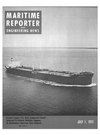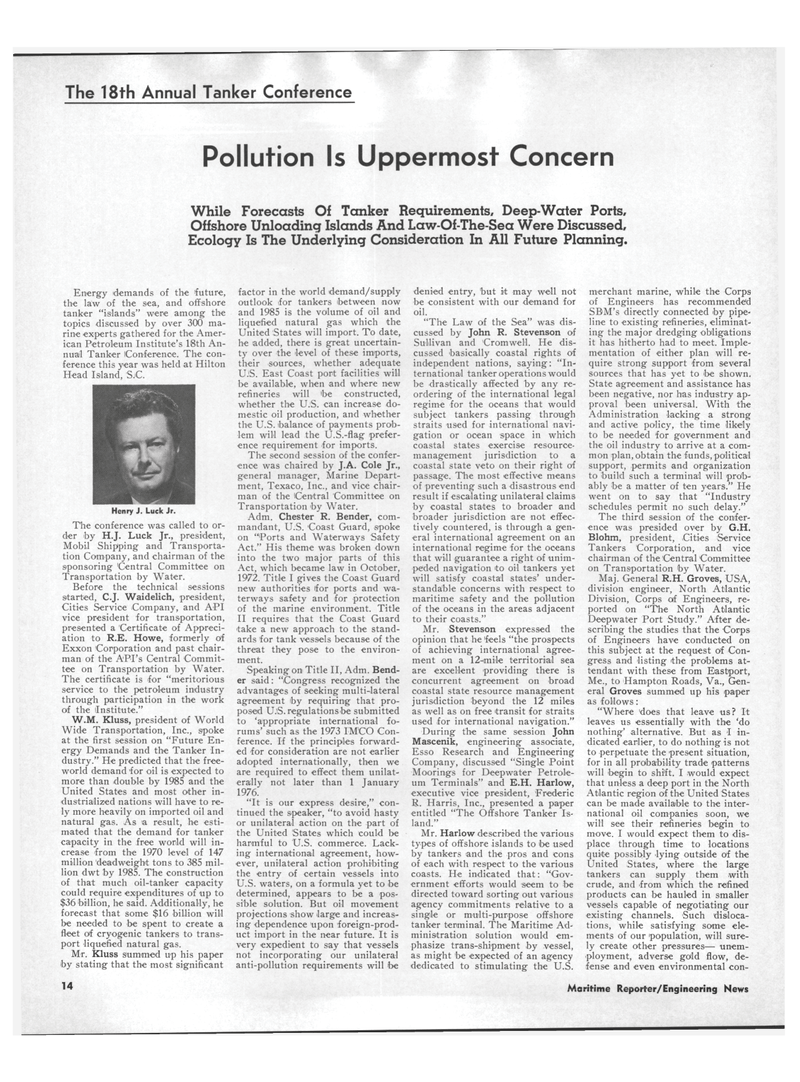
Page 12: of Maritime Reporter Magazine (July 1973)
Read this page in Pdf, Flash or Html5 edition of July 1973 Maritime Reporter Magazine
The 18th Annual Tanker Conference
Pollution Is Uppermost Concern
While Forecasts Of Tanker Requirements, Deep-Water Ports,
Offshore Unloading Islands And Law-Of-The-Sea Were Discussed,
Ecology Is The Underlying Consideration In All Future Planning.
Energy demands of the future, the law of the sea, and offshore tanker "islands" were among the topics discussed by over 300 ma- rine experts gathered for the Amer- ican Petroleum Institute's 18th An- nual Tanker Conference. The con- ference this year was held at Hilton
Head Island, S.C.
Henry J. Luck Jr.
The conference was called to or- der by H.J. Luck Jr., president,
Mobil Shipping and Transporta- tion Company, and chairman of the sponsoring 'Central Committee on
Transportation by Water.
Before the technical sessions started, C.J. Waidelich, president,
Cities Service Company, and API vice president for transportation, presented a Certificate of Appreci- ation to R.E. Howe, formerly of
Exxon Corporation and past chair- man of the API's Central Commit- tee on Transportation by Water.
The certificate is for "meritorious service to the petroleum industry through participation in the work of the institute."
W.M. Kluss, president of World
Wide Transportation, Inc., spoke at the first session on "Future En- ergy Demands and the Tanker In- dustry." He predicted that the free- world demand for oil is expected to more than double by 1985 and the
United States and most other in- dustrialized nations will have to re- ly more heavily on imported oil and natural gas. As a result, he esti- mated that the demand for tanker capacity in the free world will in- crease from the 1970 level of 147 million deadweight tons to 385 mil- lion dwt by 1985. The construction of that much oil-tanker capacity could require expenditures of up to $36 billion, he said. Additionally, he forecast that some $16 billion will be needed to be spent to create a fleet of cryogenic tankers to trans- port liquefied natural gas.
Mr. Kluss summed up his paper by stating that the most significant factor in the world demand/supply outlook for tankers between now and 1985 is the volume of oil and liquefied natural gas which the
United States will import. To date, he added, there is great uncertain- ty over the level of these imports, their sources, whether adequate
U.S. East Coast port facilities will be available, when and where new refineries will 'be constructed, whether the U.S. can increase do- mestic oil production, and whether the U.S. balance of payments prob- lem will lead the U.S.-flag prefer- ence requirement for imports.
The second session of the confer- ence was chaired by J.A. Cole Jr., general manager, Marine Depart- ment, Texaco, Inc., and vice chair- man of the Central Committee on
Transportation by Water.
Adm. Chester R. Bender, com- mandant, U.S. Coast Guard, spoke on "Ports and Waterways Safety
Act." His theme was broken down into the two major parts of this
Act, which became law in October, 1972. Title I gives the Coast Guard new authorities if or ports and wa- terways safety and for protection of the marine environment. Title
II requires that the Coast Guard take a new approach to the stand- ards for tank vessels because of the threat they pose to the environ- ment.
Speaking on Title II, Adm. Bend- er said: "Congress recognized the advantages of seeking multi-lateral agreement by requiring that pro- posed U.S. regulations be submitted to 'appropriate international fo- rums' such as the 1973 IMCO Con- ference. If the principles forward- ed for consideration are not earlier adopted internationally, then we are required to effect them unilat- erally not later than 1 January 1976. "It is our express desire," con- tinued the speaker, "to avoid hasty or unilateral action on the part of the United States which could be harmful to U.S. commerce. Lack- ing international agreement, how- ever, unilateral action prohibiting the entry of certain vessels into
U.S. waters, on a formula yet to be determined, appears to be a pos- sible solution. But oil movement projections show large and increas- ing dependence 'upon foreign-prod- uct import in the near future. It is very expedient to say that vessels not incorporating our unilateral anti-pollution requirements will 'be denied entry, but it may well not be consistent with our demand for oil. "The Law of the Sea" was dis- cussed by John R. Stevenson of
Sullivan and Cromwell. He dis- cussed basically coastal rights of independent nations, saying: "In- ternational tanker operations would be drastically affected by any re- ordering of the international legal regime for the oceans that would subject tankers passing through straits used for international navi- gation or ocean space in which coastal states exercise resource- management jurisdiction to a coastal state veto on their right of passage. The most effective means of preventing such a disastrous end result if escalating unilateral claims by coastal states to broader and broader jurisdiction are not effec- tively countered, is through a gen- eral international agreement on an international regime for the oceans that will guarantee a right of unim- peded navigation to oil tankers yet will satisfy coastal states' under- standable concerns with respect to maritime safety and the pollution of the oceans in the areas adjacent to their coasts."
Mr. Stevenson expressed the opinion that he feels "the prospects of achieving international agree- ment on a 12-mile territorial sea are excellent providing there is concurrent agreement on broad coastal state resource management jurisdiction beyond the 12 miles as well as on free transit for straits used for international navigation."
During the same session John
Mascenik, engineering associate,
Esso Research and Engineering
Company, discussed "Single Point
Moorings for Deepwater Petrole- um Terminals" and E.H. Harlow, executive vice president, Frederic
R. Harris, Inc., presented a paper entitled "The Offshore Tanker Is- land."
Mr. Harlow described the various types of offshore islands to be used by tankers and the pros and cons of each with respect to the various coasts. He indicated that: "Gov- ernment efforts would seem to be directed toward sorting out various agency commitments relative to a single or multi-purpose offshore tanker terminal. The Maritime Ad- ministration solution would em- phasize trans-shipment by vessel, as might be expected of an agency dedicated to stimulating the U.S. merchant marine, while the Corps of Engineers has recommended
SB'M's directly connected by pipe- line to existing refineries, eliminat- ing the major dredging obligations it has hitherto had to meet. Imple- mentation of either plan will re- quire strong support from several sources that has yet to 'be shown.
State agreement and assistance has been negative, nor has industry ap- proval been universal. With the
Administration lacking a strong and active policy, the time likely to be needed for government and the oil industry to arrive at a com- mon plan, obtain the funds, political support, permits and organization to build such a terminal will prob- ably be a matter of ten years." He went on to say that "Industry schedules permit no such delay."
The third session of the confer- ence was presided over by G.H.
Blohm, president, Cities Service
Tankers Corporation, and vice chairman of the Central Committee on Transportation by Water.
Maj. General R.H. Groves, USA, division engineer, North Atlantic
Division, Corps af Engineers, re- ported on "The North Atlantic
Deepwater Port Study." After de- scribing the studies that the Corps of Engineers have conducted on this subject at the request of Con- gress and listing the problems at- tendant with these from Eastport,
Me., to Hampton Roads, Va., Gen- eral Groves summed up his paper as follows: "Where does that leave us? It leaves us essentially with the 'do nothing' alternative. But as I in- dicated earlier, to do nothing is not to perpetuate the present situation, for in all probability trade patterns will begin to shift. I would expect that unless a deep port in the North
Atlantic region of the United States can be made available to the inter- national oil companies soon, we will see their refineries begin to move. I would expect them to dis- place through time to locations quite possibly lying outside of the
United States, where the large tankers can supply them with crude, and from which the refined products can be hauled in smaller vessels capable of negotiating our existing channels. Such disloca- tions, while satisfying some ele- ments of our population, will sure- ly create other pressures— unem- ployment, adverse gold flow, de- fense and even environmental con- 14 > Maritime Reporter/Engineering News

 11
11

 13
13
